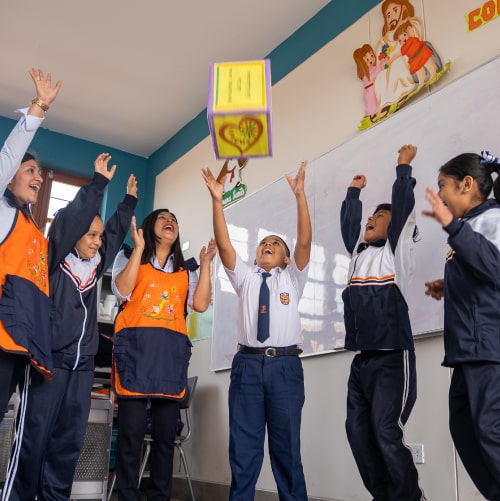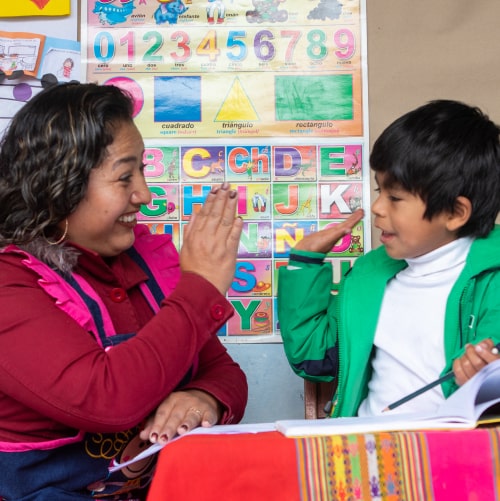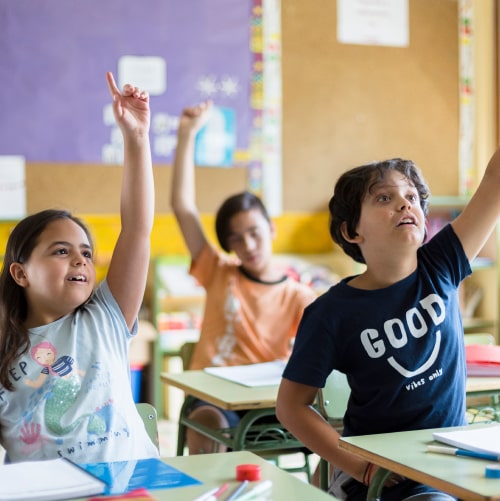“Companies of all scales are questioning their business models to incorporate social and environmental factors. Social entrepreneurs are giving evidence that business can be linked with social and environmental responsibility”, says Wiese Foundation CEO.
Her mother was Brazilian and creator of volunteering at Inabif. Ingrid Claudet lived that episode up close. Maybe from her he inherited social sensibility. His father was an agronomist who toured Peru when it was more complex to do so and at times traveled alongside his daughter, along the north coast. Maybe from him he inherited a passion for Peru.
That family heritage materializes in the position it occupies today. Ingrid Claudet is the general manager of the Wiese Foundation, which this 2020 celebrates 60 years of its 10th birthday. Remember that one of the most emblematic programs of the foundation is the archaeological complex El Brujo, on the north coast. An institution that now sponsors and directs the Entrepreneurship Fund, which, among 112 initiatives presented, will finance and advise four social companies that involve Cusco’s communes, people with disabilities, Chorrillos prison women and teenage mothers.
She feels that she occupies a privileged place, because it is a task in which she can help others. “I work almost 24 hours a day, full, and I do it because it gives me so much satisfaction. I’ve always been half-todist. I love everything and I learn fast. And I still have my list of things I want to do,” she tells me from her office, at the top of a sanisidrino building, but – cautious – she prefers to keep in reserve what she has written on that list.
Within the realm of entrepreneurship, what does the social component imply?
It is a company formally constituted, but that within its business model incorporates a vulnerable community with the aim of improving the quality of life, which is improved by incorporating them as suppliers, or giving them decent employment or making available to these people products and services at reasonable prices and where they live.
Are there any such ventures missing?
I think so. Social entrepreneurship becomes a kind of global trend. Increasingly, companies of all scales are questioning their business models to incorporate social and environmental factors. Social entrepreneurs are setting a pattern, giving concrete evidence that business can be united with social and environmental responsibility.
And how is Peru in social entrepreneurship?
A Latin America level, is a country whose entrepreneurship ecosystem has evolved at fairly rapid paces. Even so, the region is far behind other regions.
How should the ideal scenario be?
In Peru, the Wiese Foundation is the first institution, of a family nature, to actively engage in social entrepreneurship issues. It is a foundation that invests income contributions from its assets to boost and accelerate social entrepreneurship. The Entrepreneur Fund is still unique in its gender. We are committed to social entrepreneurship as a sustainable way to generate social impact in certain vulnerable communities. But more players need to be actively involved, more non-profit institutions willing to contribute capital, which in many cases must be philanthropic, which has no return because its purpose is social. The idea of the program is to support until these ventures are more robust and able to access other sources of funding. After the call, which lasted a year, the projects chosen are Llama Pack (tourism), Empanacombi (culinary), Pixed (technology) and Estrafalario (urban fashion).
Does the Peruvian have in his DNA the entrepreneurial and, at the same time, solidarity?
I think so and, above all, in those endeavors that are outside Lima. Of those who have been chosen, two are from Lima and two from Cusco and Piura. Peruvians are increasingly aware that if any type of company does not incorporate social and environmental variables into its business model, it will not be sustainable and that is seen even in large corporations, transnational.
The Wiese Foundation is 60 years old. Can a balance be made?
Various initiatives and projects have been developed in education, culture, scientific research, health. The foundation was created by Don Augusto Wiese Eslava, the grandfather of those who are today members of the board of administration of the institution, and the mandate was to promote the individual and collective good, under the vision that better citizens will forge Peru in the future.
Are we all potentially entrepreneurs?
everyone. But it is not limited to creating a business. One can have an entrepreneurial spirit within an institution, a company. Entrepreneurship is very valuable because it is very much associated with innovation.
To Creation!
And to be courageous also to take on challenges and responsibilities in a often unstructured context.
Has being a woman and coming to a high office been an opportunity or a factor against it?
it has never been a topic for me. If someone had discriminating thoughts because I am a woman, I have never felt affected. For me, being a woman has always been an opportunity. It is about giving equal value to all human beings. What is not acceptable is any form of discrimination or violence. Although there are changes.
I guess the changes are for the better.
that’s it. If it didn’t change that way, humanity would miss half the story. Half are women, and if they are not incorporated on a level playing field, the world misses half the story (smiles).
Autobiography
– “I am Ingrid Claudet Lascosque. I’m 49 years old, I was born in Lima. Upon leaving school, I studied Business Administration and Translation; both races were developed simultaneously. Then I followed a master’s degree in business. I liked languages a lot from a very young girl.”
– “In the master’s degree I did abroad, I majored in Marketing, at a university in Los Angeles. And then I majored in Digital Marketing, at a prestigious university in Peru, it was the last time I was in a classroom formally. I’d like to go back.”
– “By 2020, the Wiese Foundation has also begun the execution of the first project of tax works for scientific research, we will do so in the El Brujo complex. We have reissued the book of Julius C. Tello Chavín. Parent culture of ancient civilization; we plan to launch it in May.”









